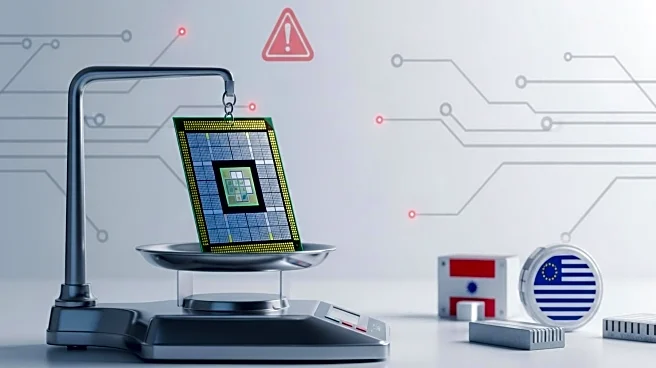What's Happening?
A recent investigation by the Select Committee on China, led by Chairman John Moolenaar and Ranking Member Raja Krishnamoorthi, has revealed that American and allied companies have significantly contributed to China's semiconductor industry. Companies such as ASML, Tokyo Electron, Applied Materials, KLA, and Lam Research have been selling semiconductor manufacturing equipment to Chinese state-owned and military-linked companies. This has raised alarms about the potential impact on U.S. national security, as these semiconductors are crucial for China's military advancements and human rights abuses. The investigation highlights that these companies have seen substantial revenue from China, with TEL receiving 44% of its revenue from the country in 2024, and others like Lam Research and KLA also reporting significant percentages.
Why It's Important?
The findings of this investigation underscore the strategic importance of semiconductors in global technology and military competition. By selling critical manufacturing equipment to China, these companies are inadvertently strengthening China's military capabilities and its ability to resist export restrictions. This poses a direct threat to U.S. national security and its technological leadership. The investigation also points out the ethical implications, as China's use of advanced technology for human rights violations is well-documented. The U.S. and its allies face the challenge of balancing economic interests with national security and ethical considerations, as they navigate the complex landscape of global semiconductor trade.
What's Next?
The investigation recommends several measures to address these concerns, including aligning export controls among the U.S., the Netherlands, and Japan, expanding the list of restricted entities, and enhancing enforcement resources. These steps aim to curb the flow of critical technology to China and protect U.S. and allied interests. The report also calls for improved communication between governments and the semiconductor industry to maintain innovation leadership. As the U.S. and its allies consider these recommendations, the semiconductor industry may face increased scrutiny and regulatory changes, impacting their operations and market strategies.
Beyond the Headlines
The investigation highlights a broader geopolitical struggle over technological dominance, with semiconductors at its core. The U.S. and its allies must navigate the delicate balance of maintaining economic ties with China while safeguarding national security. This situation also raises questions about corporate responsibility and the ethical implications of doing business with entities linked to human rights abuses. The outcome of this investigation could set a precedent for how nations address similar challenges in other critical technology sectors.










